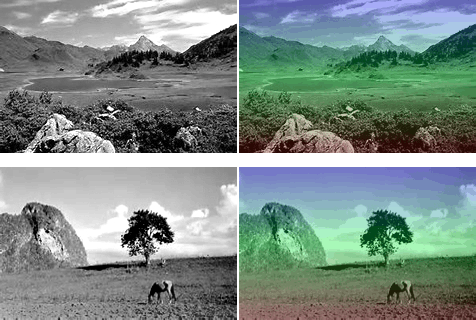
// Die ganze Sache
ist mehr ein Gag als richtige Einfärbung.
// Vor Einführung des Farb-Fernsehens (am 25. August 1967)
// gab es tatsächlich blau/grün/braun gefärbte Folien, die man
// vor den Bildschirm klebte, um so die Illusion von farblichem
// Sehen zu erzeugen. Der folgende Code bildet das einfach nach.
// Getestet mit D2010 unter
Win7

procedure SWColor(Src, Dst: TBitmap);
var
Hlp: TBitmap;
P1, P2: PByteArray;
X, Y, B3: Integer;
B: Byte;
procedure vorbereitung(bm: TBitmap);
begin
with bm do
begin
Width := Src.Width;
Height := Src.Height;
PixelFormat := pf24Bit;
end;
end;
procedure Verlauf(cv: TCanvas; Rect: TRect; C: Array of TColor);
type
RgbArray = Array [0 .. 2] of Byte;
var
X, Y, Z, Stelle, Mx, Bis, Fach, Mass: Integer;
Faktor: double;
A: RgbArray;
B: Array of RgbArray;
begin
Mx := high(C);
Mass := Rect.bottom - Rect.top;
setlength(B, Mx + 1);
for X := 0 to Mx do
begin
C[X] := colortorgb(C[X]);
B[X][0] := getrvalue(C[X]);
B[X][1] := getgvalue(C[X]);
B[X][2] := getbvalue(C[X]);
end;
cv.Pen.Width := 1;
cv.Pen.Style := psSolid;
Fach := round(Mass / Mx);
for Y := 0 to Mx - 1 do
begin
if Y = Mx - 1 then
Bis := Mass - Y * Fach - 1
else
Bis := Fach;
for X := 0 to Bis do
begin
Stelle := X + Y * Fach;
if Bis = 0 then
Faktor := 1
else
Faktor := X / Bis;
for Z := 0 to 2 do
A[Z] := Trunc(B[Y][Z] + ((B[Y + 1][Z] - B[Y][Z]) * Faktor));
cv.Pen.Color := RGB(A[0], A[1], A[2]);
cv.MoveTo(Rect.left, Rect.top + Stelle);
cv.LineTo(Rect.right, Rect.top + Stelle);
end;
end;
B := nil;
end;
begin
B3 := Src.Width * 3;
Hlp := TBitmap.Create;
vorbereitung(Dst);
vorbereitung(Hlp);
Dst.Canvas.Draw(0, 0, Src);
Verlauf(Hlp.Canvas, Hlp.Canvas.ClipRect, [clBlue, $33FF00, clMaroon]);
for Y := 0 to Dst.Height - 1 do
begin
X := 0;
P1 := Dst.ScanLine[Y];
P2 := Hlp.ScanLine[Y];
while X < B3 do
begin
B := Trunc(P1[X] * 0.11 + P1[X + 1] * 0.59 + P1[X + 2] * 0.3);
P1[X] := (B * 2 + P2[X]) div 3;
P1[X + 1] := (B * 2 + P2[X + 1]) div 3;
P1[X + 2] := (B * 2 + P2[X + 2]) div 3;
inc(X, 3);
end;
end;
Hlp.Free;
end;
// Beispiel für zwei Images, in denen JPegs sind
procedure TForm2.Button1Click(Sender: TObject);
var
bmp1: TBitmap;
bmp2: TBitmap;
begin
bmp1 := TBitmap.Create;
bmp2 := TBitmap.Create;
bmp1.Assign(Image1.Picture.Graphic);
SWColor(bmp1, bmp2);
Canvas.Draw(Image1.BoundsRect.right + 2, Image1.top, bmp2);
bmp1.Assign(Image2.Picture.Graphic);
SWColor(bmp1, bmp2);
Canvas.Draw(Image2.BoundsRect.right + 2, Image2.top, bmp2);
bmp2.Free;
bmp1.Free;
end;

|






